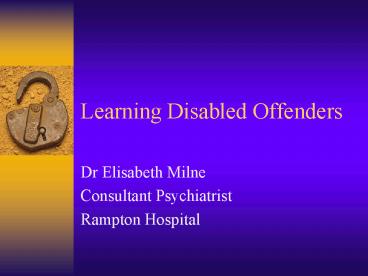Learning Disabled Offenders - PowerPoint PPT Presentation
1 / 16
Title:
Learning Disabled Offenders
Description:
... Impulsive acts Without 'intent' Lack 'mens rea' Moderate or severe LD or ... Fitness to plead often an issue. Typologies in Forensic LD - 3 ... – PowerPoint PPT presentation
Number of Views:35
Avg rating:3.0/5.0
Title: Learning Disabled Offenders
1
Learning Disabled Offenders
- Dr Elisabeth Milne
- Consultant Psychiatrist
- Rampton Hospital
2
What is Learning Disability?
- Not such a stupid question in an international
context - Not the same as learning or educational
difficulties - ICD10 diagnostic categories F70 F79
- DSM IV diagnostic categories 317 319
3
What is Learning Disability?
- Internationally accepted term is Mental
Retardation - Legal term in the UK is Mental Impairment or
Severe Mental Impairment for most purposes. - Not surprisingly the use of many different terms
leads to significant confusion
4
What is Learning Disability?
- Impairment of intelligence is key, although
lesser degrees of impairment with significant
social/language/behaviour deficits could/should
be included - My personal view is that if a person fulfils the
criteria for a diagnosis of Learning Disability
then they should be allowed to receive specialist
services irrespective of gender, other diagnoses
and where they live.
5
Who are the Learning Disabled Offenders?
- More males than females mirrors situation in
non-LD offenders. - Service provision reflects this
- Most identified LD offenders are functioning in
the mild LD/borderline range - Frequent history of childhood behaviour disorder
- Deprived or abusive background
6
Who are the Learning Disabled Offenders?
- High rates of co-morbidity with other psychiatric
diagnoses more marked in Medium and High Secure
cohorts - Excess of epilepsy in 5 year study of offenders
admitted to Northgate - Excess of speech/language dysfunction even when
IQ corrected for ?
7
Vulnerability factors
- Inadequate/faulty socialisation skills
- Impaired self-control
- Inability to resist temptation
- Naïvety or gullibility
- Lack of understanding of social norms often
aggravated by reluctance of caregivers to
appropriately deal with offending behaviour
8
Vulnerability factors
- Immature sexuality or disinhibited sexual
behaviour - Inability to manage finances
- Low self-esteem/poor self image
- Inability to adequately/appropriately express
emotions affection, dissent, anger or
frustration
9
Typologies in Forensic LD - 1
- Those with similar needs Aggressive/Impulsive
acts Without intent Lack mens
rea Moderate or severe LD or Autistic
Spectrum Disorders - Not well served by Forensic LD services need
diversion at an early stage to appropriate
service provision
10
Typologies in Forensic LD - 2
- The vulnerable/gullible victim of
circumstance Involved in petty
crime encouraged by more skilled
mates may be a co-defendant - Fitness to plead often an issue
11
Typologies in Forensic LD - 3
- The decompensated typically mild/borderline
LD not thought to be an issue pre
remand/trial Unable to cope with
incarceration Features of underlying PD or
concurrent mental illness - Require transfer from custody
12
Typologies in Forensic LD - 4
- The impaired criminal Belong to a criminal
subculture Present with features of PD rather
than LD Frequent co-morbid
alcohol/substance misuse - Get directed from custody at end of sentence if
still thought to pose a risk
13
Risky Typologies
- Type 1 Bad luck gives rise to provocation
or temptation - Type 2 Individual seeks out risky
situations by choice - Type 3 Individual constantly vigilant for
opportunities to offend - Type 4 Individual contrives to create
offending situations - Walker 1991
14
Types of offending
- Most studies have been of hospital in-patients
- Offence types seen vary according to the level of
security in which you are assessing or treating
the person and where the person is in the
therapeutic pathway - Property offences constitute majority
- High recidivism rate (Robertson 1981) and wide
range of other offence types also committed
15
Types of offending
- Walker and McCabe (1973) and Day (1990) found an
excess of arson and sex offenders in LD patients
made subject to hospital orders - LD offenders possibly under represented in crimes
of serious personal violence including homicide - High Security only for those who are believed
to represent a grave and immediate risk
homicide, serious sexual crimes, arson
16
And finally..
- What cross cultural comparisons?































